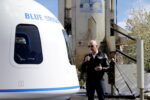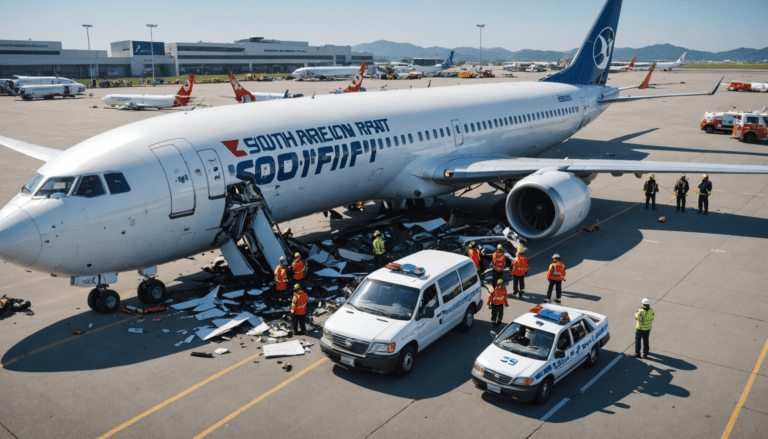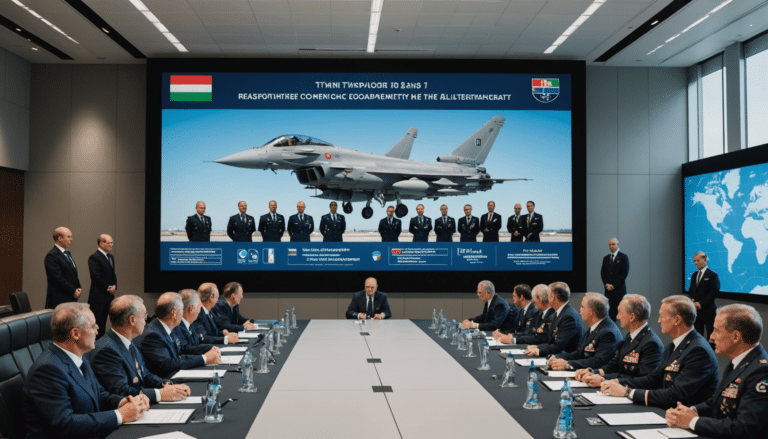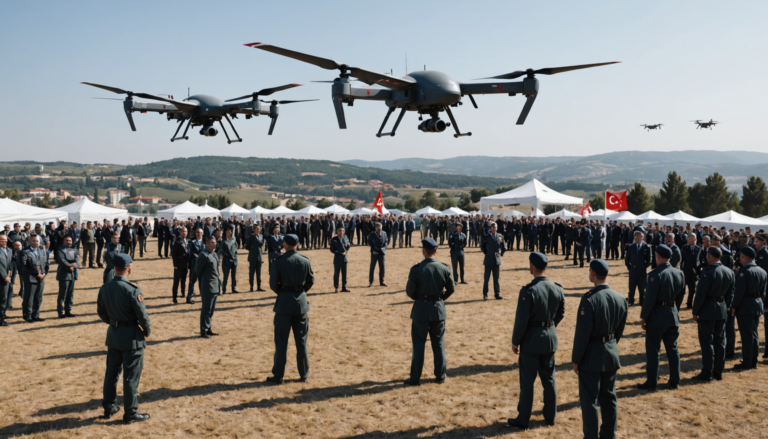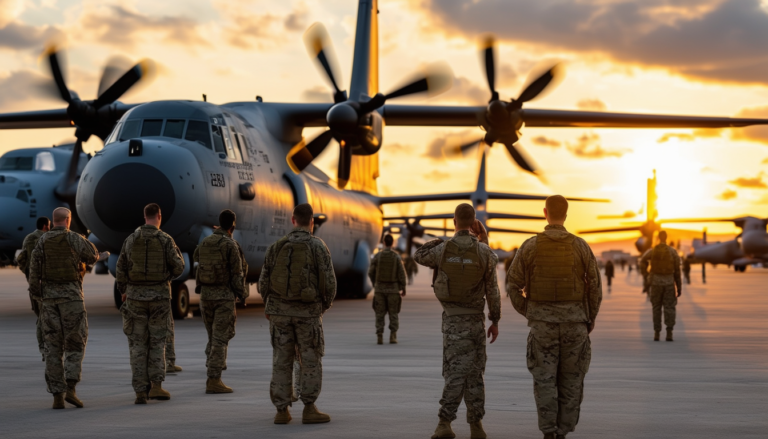“`html
A surprising event shakes the American political world.
The United States Secretary of Defense, Pete Hegseth, has accepted
a Boeing 747 donated by Qatar to serve as Air Force One.
This grand offer, valued at several hundred million dollars, raises numerous constitutional and ethical questions. The idea of using a plane donated by a foreign power for the ultra-sensitive transport of the president raises major security concerns. President Donald Trump defends this decision, calling it an “essential generous gesture.” On the other hand, Democratic leader Chuck Schumer is proposing legislation to prevent the use of this aircraft. Debates are intensifying as some Republicans also express their reservations about this controversial initiative. The future of this agreement remains uncertain as the government seeks to reconcile international support with respect for national standards.
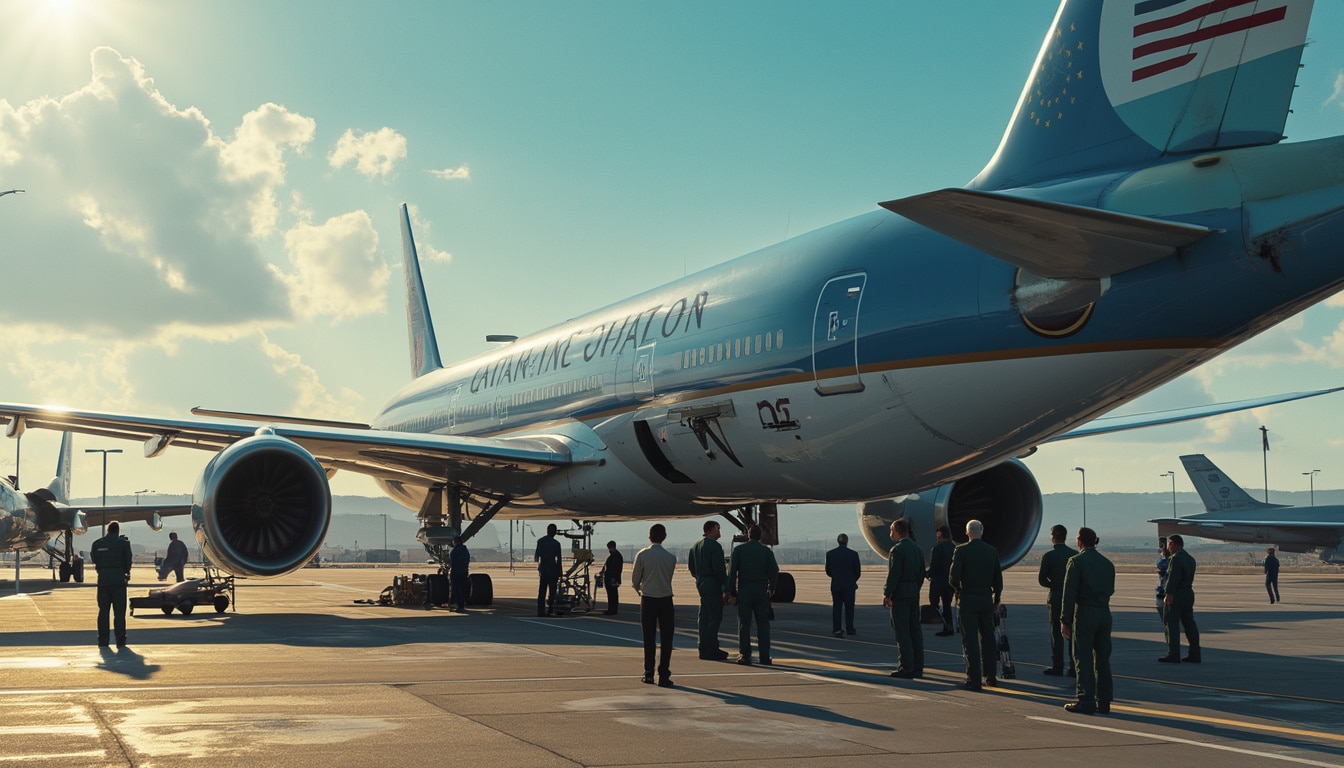
Table des matières
ToggleContext of Qatar’s offer
In May 2025, the Secretary of Defense of the United States, Pete Hegseth, announced the acceptance of a Boeing 747 donated by the emirate of Qatar to serve as Air Force One, the American presidential plane. This generous contribution, valued at several hundred million dollars, has sparked intense media interest and political debates.
The offer from Qatar is not merely an act of goodwill; it is part of a broader strategy to strengthen military and economic ties between the two nations. Qatar, rich in oil resources, seeks to diversify its international relations, and this donation can be seen as a way to consolidate its influence in the United States. This gesture is also a way for Qatar to demonstrate its commitment to Western alliances and its willingness to support American defense initiatives.
However, this initiative is not without controversy. The acceptance of this jet by the United States raises crucial questions regarding the constitutional and ethical implications of receiving such a gift from a foreign state. Moreover, security concerns arise regarding the use of a plane provided by a foreign power for such sensitive missions as the transport of the president.
To learn more about the geopolitical stakes related to this decision, you can consult this detailed article that explores the impact of this offer on international relations and power dynamics within the Pentagon.
Constitutional and ethical implications
The acceptance of a presidential plane donated by a foreign state, such as Qatar, highlights major constitutional issues. According to the Emoluments Clause enshrined in the American Constitution, government officials are prohibited from receiving gifts from sovereigns or foreign states. This provision aims to prevent any conflict of interest and to maintain the integrity of public functions.
Despite this restriction, President Donald Trump defended the acceptance of the plane, labeling the offer as a “generous gesture” and claiming it would be “foolish” to refuse such a gift. This stance has triggered intense controversy within Congress and public opinion, with critics pointing out that this decision could open the door to undesirable foreign influences on American internal affairs.
Opponents of this acceptance, notably members of the Democratic Party, have responded by introducing legislation aimed at blocking the use of the plane. For instance, the Presidential Airlift Security Act proposed by Senate Minority Leader Chuck Schumer seeks to prohibit the use of public funds to renovate a plane previously owned by a foreign government.
This situation raises ethical questions about the boundary between diplomacy and personal interests. Furthermore, it highlights the need for a strict enforcement of constitutional standards to ensure transparency and accountability within the government. For a more in-depth analysis of the ethical challenges posed by this situation, consult this article that discusses the essential skills in military intelligence.
Security and reliability of the donated jet
The use of a Boeing 747 donated by Qatar as Air Force One raises legitimate security concerns. Indeed, the aircraft must meet extremely strict safety standards to ensure the protection of the president and his travels. The delicate balance between using an aircraft provided by a foreign power and national security requirements is at the heart of the debates.
The Pentagon has assured that all federal rules and regulations have been adhered to in the acceptance of the plane. According to Pentagon spokesman Sean Parnell, appropriate security measures will be implemented to ensure that the aircraft meets the necessary functional and safety requirements.
However, some security experts remain skeptical about the possibility of modifying a foreign aircraft to meet the rigorous standards of the U.S. Air Force. The technical and logistical challenges associated with adapting the plane for such sensitive missions are considerable.
Furthermore, integrating cutting-edge technologies and secure communication systems into a plane provided by a foreign state is a complex task. Substantial modifications may be necessary to adapt the Boeing 747 to the specific needs of secure presidential transport. For a technical perspective on the challenges of air security, drones/”>this article provides an in-depth analysis of defense technologies against aerial threats.
Political and legislative reactions in the United States
The announcement of the acceptance of the Qatari Boeing 747 by the Secretary of Defense has sent shockwaves through the American political landscape. Republicans, while expressing some reservations, largely support President Trump in this decision. The Senate Majority Leader, John Thune, loyal to Trump, has not yet taken concrete steps to counter this initiative.
In contrast, Democrats have quickly responded by introducing the Presidential Airlift Security Act, proposed by Chuck Schumer. This legislation aims to prevent the use of public funds to adapt a plane previously owned by a foreign government as Air Force One. Schumer accuses Trump of being likely to compromise national security for personal gain, emphasizing that the necessary modifications would cost taxpayers billions of dollars.
Schumer’s proposal represents a strategic attempt to block the use of the Qatari plane by using legislative procedures, including incorporating it as an amendment into spending bills that Republicans are compelled to address. This maneuver underscores the deep partisan divisions surrounding the issue and highlights the tensions between the executive and legislative branches on foreign policy and national security matters.
Debates in Congress are far from over, and the outcome of this legislation could have lasting repercussions on how the United States manages foreign donations and presidential air security issues. To keep up with ongoing legislative developments, consult this article that discusses the reactions of Russian forces in the current context.
Impact on international relations
The acceptance of the Qatari Boeing 747 by the United States has significant repercussions on international relations, particularly in the context of strategic alliances and global power balances. This donation can be interpreted as a strengthening of ties between Washington and Doha, but it may also raise concerns among other U.S. allies and adversaries.
The gesture from Qatar could be seen as an attempt to strengthen its geopolitical position in the Middle East by forging closer ties with the United States. This could lead to a reevaluation of regional dynamics, particularly regarding relations with Iran and other key players in the region. Additionally, this initiative may prompt other nations to offer similar contributions, thereby complicating diplomatic relations and American foreign policy decisions.
Diplomatically, the use of a foreign aircraft as the seat of the American executive power could be interpreted as a form of increased dependence on international partners, which could weaken the perception of American autonomy and military strength. This situation might also draw the attention of America’s traditional allies, who may question whether the country is willing to accept contributions that could compromise its strategic interests.
For a detailed analysis of the impact of this decision on international relations and strategic alliances, this article explores the implications of military and technological initiatives in the current context.
Future perspectives on the use of foreign aircraft
The acceptance of a presidential aircraft provided by a foreign state paves the way for new reflections on the future of using foreign devices in official roles in the United States. This decision could set a precedent for future international collaborations, but it also raises questions about security, independence, and national sovereignty.
If this initiative is successful, it could encourage other nations to offer similar contributions, thereby strengthening bilateral and multilateral ties. However, each offer will need to be rigorously evaluated to ensure that it meets the required security and confidentiality standards for such sensitive functions as presidential transport.
On the other hand, there is a risk that the recurrent acceptance of such gifts could compromise the perception of American independence and increase dependence on foreign partners. This could also lead to internal tensions, with political factions opposed to the idea of receiving donations from foreign states, as has recently been the case with the Presidential Airlift Security Act.
Furthermore, the rapid technological evolution in the fields of aviation and air security requires a constant adaptation of protocols and infrastructures. The United States will need to continually invest in modernizing its presidential aircraft to ensure they remain at the forefront of technology and security, regardless of the aircraft’s supplier.
To understand future trends in defense and air technology, this article provides insight into technological innovations and emerging defense strategies.













